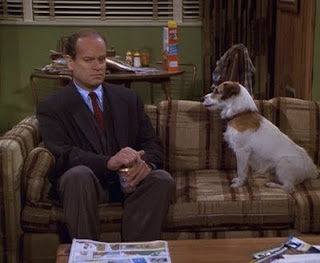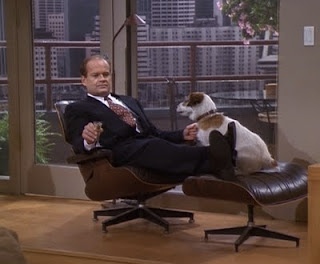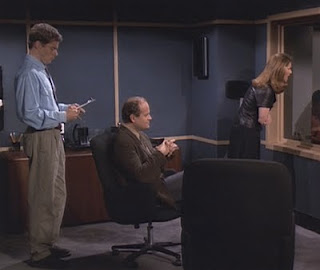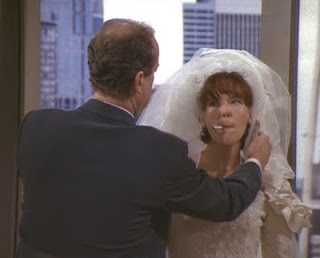

Frasier (on tape): Good afternoon, Seattle. My name is Dr. Frasier Crane. If you can feel, I can heal.
Frasier (in the present): Fasten your seatbelt, Eddie. It’s going to be a bumpy ride.
The end of the season brings us full circle to the start, in a nice little story that revisits the series’ emotional roots. It follows the pattern of the last two season finales, being another episode built on contemplation and Frasier and other characters considering their lives and where they are. The difference is that this time, we effectively get a prequel, a glimpse of Frasier’s life between moving to Seattle and having to take in his father. And despite the bad rep prequels get, it’s a memorable retrospective.
May 21, 1996 marks the third anniversary of The Dr. Frasier Crane Show, and Roz gives Frasier a tape of the first show as a gift. Listening to it sweeps Frasier into a reverie, remembering his disastrous first day, when Roz was a last minute sub for his planned producer (who dumped him for reasons Frasier can’t quite understand) and he couldn’t think of a decent catchphrase. When he meets Niles later that day, he’s reminded, begrudgingly, that he hasn’t been to see his father, who is still living on his own, since he came back to Seattle. The two have been out of touch since mom died, and reconnecting is going to be tough.
There’s a nice parallel plot in the present, where Daphne has a vacation coming up and is trying to decide between seeing her family and heading off to sunny Acapulco. She asks Frasier the all important question, “Why is it so easy to love our families but so difficult to like them?”, and that’s probably what weighs on Frasier’s mind as he listens. Frasier and Martin weren’t getting along when the series started, and things were apparently even worse before then. It’s a really jarring contrast between the easy, joking friction they have in the show’s present and the genuine emotional tension of their earlier relationship, and when we return to the present at the end we get an encouraging sign that things have progressed (Martin can now listen to up to 10 minutes of his son’s show before falling asleep.)
So, it’s not really about Frasier’s first show, but we get all sorts of fascinating details and jokes built on the situational irony of knowing what’s going to happen in the future. Niles and Roz have a rude brush-by at the Café Nervosa without ever really being introduced, and later Niles catches a whiff of something in the air as a certain adorable Manchester girl (in the most 90s outfit imaginable) briefly dips in and out of scene. And Eddie, who used to stare at Niles, finds a new object of affection. The episode is full of rewards for regular viewers, and the show’s been around enough to indulge them. It’s one of the pleasures of a show lasting into later seasons- it can build on and play around with our knowledge of its characters, tropes, and running gags.
Frasier’s long-form flashback gives him an answer to Daphne’s dilemma, letting her take two vacations so that she can be with her family and work off the tension of being with her family. (This is a good idea that needs to catch on.) His position- that family is tough but rewarding work- is a theme that comes up in the series a lot. The same could be said of relationships in general, but at least we get to choose some of those.
So, as with “My Coffee With Niles”, the season ends with Frasier in a place of serenity. The show’s ability to take these little emotional and philosophical jaunts is one of the things that puts it in such rarefied territory; though it’s a situation comedy, the situation can be as simple as a little quiet time. Not all the finales are like this, and most aren’t from this point on, but the overall level of thoughtfulness remains. I’ll be taking a short break from this for probably a couple of weeks, but as soon as I decide I want to we’ll dive right into Season 4, because the unexamined life is not worth living.
Guest Caller: Sherry Lansing as Angela
Written by Linda Morris & Vic Rauseo
Directed by David Lee
Aired May 21, 1996
Frasier: Little owlet in the glen, I'm ashamed of you /
You're ungrammatical at speaking as you do. /
You should say "to whom, to whom," not "to who, to who." /
Your little friend Miss Katydid may be green, 'tis true, /
But you've never heard her say, /
(sees Roz enter)
Who the hell are you?






